- Home
- Elmore Leonard
Escape From Five Shadows Page 2
Escape From Five Shadows Read online
Page 2
Renda and Brazil came out of the willow shade. Bowen rose and moved to the end of the wagon, then looked forward to the team again as he saw Pryde staring in that direction. Manring stood by one of the horses adjusting the harness and Renda was leaning over his saddle horn, saying something to him.
They forded the creek. On the other side, they followed wagon tracks that formed a long, slow-sweeping curve up to the jackpines along the crest, then skirted the shoulder of the hill before sloping down again and after this the trail kept to deep, rock-rimmed draws that twisted through the hills.
Renda rode in the lead now, turning in his saddle every few minutes to look back at the wagon. Behind the supply load, he could not see the two men on the end gate. They were Brazil’s concern. Brazil and his Winchester brought up the rear, keeping not more than twenty feet behind the wagon.
The two men on the end gate had not spoken since leaving the creek. Now, unexpectedly, Pryde said, “In another mile we reach the steep part.”
They sat with their legs hanging, their shoulders hunched forward and their eyes on the trail falling away beneath their feet.
Bowen said nothing.
“It’s steep enough,” Pryde mumbled, “that we’ll have to get off and lean on a wheel.”
“I know that,” Bowen said.
“How? This is your first trip.”
“I was told.”
“What else were you told?”
“That was enough.”
Pryde’s eyes raised momentarily to Brazil following them. “That boy’s dying to use his Winchester.”
“If you want to talk,” Bowen said, “tell me something I don’t know.”
Pryde’s jaw tightened, then relaxed slowly. “You’re tough, huh?”
Bowen didn’t answer.
“It takes more than being tough,” Pryde said. He was silent for a moment. “You’re thinking when we reach the grade and have to get off, that’s the time to go. Then or never.” Pryde paused again. “I’ll tell you one time. Don’t do it today.”
Bowen said, “You and Manring.”
“Manring has his own reason. I don’t know what that was, but I’m telling you what I feel.”
“You didn’t say anything at the creek.”
“It wasn’t the same then. If you wanted to jump, that was your business. Now there’s something wrong. That man with the Winchester knows what’s about.”
Bowen’s eyes raised. “He looks the same as always.”
“You don’t see a difference,” Pryde growled. “You feel it.”
“Well, I don’t feel it.”
“You haven’t been locked up long enough.”
“I’d say long enough,” Bowen answered.
Pryde waited. “After six years you know things. Things you didn’t know before. I don’t know how, but you do.”
Bowen glanced up, then looked down at the wagon ruts again. “When you were at Yuma…did you ever try to run?”
“Twice.”
“How long before they caught you?”
“A day one time. Four the next. They paid the Pimas fifty dollars to bring you back.”
“When you broke out…did it feel like it was the right time?”
Pryde hesitated. “I don’t remember.”
“But you’re telling me one time’s wrong and another time isn’t.”
Pryde said, “Go to hell then.” But he added, “Even if you get clear, Renda’s got better than Pimas. You know that.”
“So it’s a chance all the way.”
“You don’t outrun the trackers he’s got. They been reading sign since they were little kids.”
“That’s not something to worry about now.”
“But that Winchester is,” Pryde said.
The trail began to rise again. Bowen could feel the wagon slanting upward and his hand gripped the end gate chain close to his right leg to steady himself.
Another twenty minutes, Bowen thought. He pictured the ride in earlier that morning, coming down the steep grade and studying the country carefully as they did, then reaching this section that clung to the hill shoulder and dropped off steeply on the right side.
No, he thought, may be only ten minutes to the grade. But it doesn’t make any difference how long. When you reach it, they’ll pull you off the wagon and you’ll know.
He thought of what Pryde had told him about them being ready and expecting him to break.
That was foolishness. You don’t feel things. Even if you do, you don’t bet on a feeling. You don’t stake something big on it.
They’re always ready, he thought. It’s just a question of moving when they’re least ready.
A convict on the road gang named Chick Miller had described the trail between the camp and Pinaleño. Every foot of it that he could remember. He had told Bowen, “Going there isn’t the time. But when you’re coming back, Renda rides in front. If he was to stay behind, then the load would be between him and the driver and some places the trail is only as wide as the wagon. That means only one man’s in back to watch you. Now I’d say a man’s best time would be when you reach the high grade and have to get off. Now you’re on the ground, getting the feel of it under your shoes…and your rear guard is worrying whether the wagon’s going to come sliding back at him.”
He remembered Chick winking and saying, “That’s the time, Corey. Right then.”
And when he asked Chick why he had never tried it, the answer was that he was along in years and his legs wouldn’t bear up under running. “Boy…you’ll run till they drop off.”
Bowen had waited, every day thinking about it, picturing himself doing it…and finally this morning he was picked for the Pinaleño trip and the time had come.
Maybe Chick told Manring, Bowen thought. That’s how he knows. And Pryde picked it up from Manring.
His eyes raised to Brazil again. The Winchester was across his lap. Of course they’re ready, he thought again; but you catch them when they’re least—
Suddenly he saw his error.
Why should they be least ready at the grade? Because Chick said so?
If Brazil thought you had even a halfway better chance there he’d be readier than he was ever ready!
Why is being on the ground an advantage? Your back’s to him then!
He breathed in and out slowly and thought, more calmly: You’re facing him now. You’re looking right at him and you even know when he scratches himself.
He glanced over the side of the wagon. The trail dropped off abruptly, slanting steeply for twenty-five or thirty feet. Then thick brush. Brush and scrub pine and rock and beyond that a second slope that was more gradual.
But how do you make the Winchester wait five seconds?
He noticed loose stones along the edge of the trail and he thought: One of those could stop him long enough.
But how do you know there’ll be one where you jump off? We could come to a bare stretch just as—
He stopped…his eyes on Brazil. He watched Brazil raise the rifle barrel and rest it in the crook of his left arm. His right hand came up and across his chest and two fingers hooked into the shirt pocket to bring out the tobacco sack.
You’re looking at it, Bowen thought, knowing it, being sure of it, and feeling the excitement inside of him now and trying not to show it.
You don’t sit and think about it. You go or you don’t go.
The crook of Brazil’s left arm squeezed the barrel tightly as he poured tobacco into the troughed square of cigarette paper. Both of his hands were busy; both of them away from the trigger of the Winchester.
You go!
It was in his mind and out of his mind as he pushed himself from the wagon and went over the side of the ledge, not looking at Brazil, but hearing suddenly a hoarse yell as he hit the slope falling, sliding, raising dust, the abrupt leg shock of reaching the bottom, and now rolling and hearing another yell from above and another and lunging into the brush as a shotgun blast ripped the mesquite branches above him.
>
He was on his feet, running, stumbling through the scrub pine, then suddenly, instinctively, swerving to the left and the shotgun roared again, spattering buckshot through the trees behind him and it went through his mind: Where’s the Winchester!
But he did not look back. Coming out of the trees he hesitated, but only momentarily, only long enough to be sure of his direction. His shoes dug into the loose sand and he sprinted down the open hillside, his shoulders drawn tight waiting for the gunfire.
Then it came, the whining report and sand kicking up behind him, and he knew the Winchester was at work. Three times the .45–70 slugs whined ricocheting after him; then stopped abruptly as he reached the dense trees at the bottom of the grade. Silence followed.
He stood for a moment making himself breathe in and out slowly, then started up the slope, up through heavy timber, knowing he would not be seen now. At the top of the ridge he stopped again and this time looked back.
Far across, the wagon was a small shape on the hillside. He could make out men standing behind the wagon, but he could not distinguish one from another or even count how many were standing there. His gaze dropped down the slope, following the course he had taken, but there was no movement anywhere. Minutes went by as he waited and listened, but still there was no movement, nor the sound of anyone coming up through the trees.
Now they’ll put the trackers to work, Bowen thought…and Brazil probably already halfway there to get them.
His only chance was to make his way back to the Pinaleño station and somehow get a horse. He knew this; and he knew that he had little time before Renda’s detachment of Apache police would be reading his tracks.
3
Willis Falvey dismounted in front of the Pinaleño adobe. There was no sound in the sunlit yard. His gaze went to the stable shed, then back to the screen door of the adobe. He hesitated uncertainly before going inside.
“Demery?”
There was no answer. His eyes moved from one end of the low-ceilinged room to the other, past Demery’s open roll-top desk, past the plank table where the stage passengers ate to the small mahogany-stained bar. The dimness was a relief after the outside glare. It was quiet here, restful, and momentarily it occurred to Willis Falvey that perhaps he might stay here instead of riding all the way to Fuegos.
No, he thought then. He would want to remain all night, and that could prove embarrassing. Not like at Fuegos where he could drink all he wanted in the privacy of a hotel room—in what passed for a hotel room—then sleep it off.
Well, he could have one here…at least one. He called for Demery again, waited, then walked to the bar and poured himself a whisky. This would be the start. Perhaps by this evening he would have forgotten, for a time, Frank Renda and the convict camp and his wife, Lizann.
A horse whinnied—the sound coming from the backyard where the corral was located—then Karla’s voice.
Falvey listened, then drank down the whisky. He left the bar, walked through the kitchen, and from the back door saw Karla outside. She was rubbing down one of the relay horses in the shade of the long, main stable that extended out from the back of the adobe almost to the corral.
Willis Falvey’s eyes raised suddenly. No, there was nothing there; but for a moment he thought he had seen someone standing on the far side of the mesquite-pole corral.
“Karla.”
She looked up, seeing Falvey coming out from the adobe, his gaze shifting now and again to the corral. He was unnaturally conscious of himself, she knew, and he had to be occupied when he thought someone was looking at him—even if it was only to glance at corralled horses. The few times he had been here before, Karla noticed this—his obviously self-conscious actions, his almost complete lack of anything to say—and in a way she felt sorry for him. He was out of place at the convict camp, especially as government superintendent, and Karla was sure he realized it more than anyone else.
“Just passing by, Mr. Falvey?”
He nodded, and hesitated before saying, “I helped myself to a drink. I’ll put the money on the bar when I go back in. I heard you out here and—”
“That’s all right,” Karla said easily. “You could pay the next time for that matter.”
“I didn’t see your father inside.”
“He had to go to Fuegos.” She said then, “Your friend Renda was here to pick up supplies. I suppose you passed him coming in.”
“No, I didn’t.”
“They only left about an hour ago.”
“I took the horse trail,” Falvey said. Then asked, “Are you alone?”
She nodded, seeing his gaze move to the corral again.
“I thought I saw someone out there,” Falvey said, “just as I came out of the house.”
Karla looked out from the shade. “I don’t know who it would be.”
“No, it was probably the way the horses were standing.” Falvey was silent for a moment. “You’re here all alone?”
“I’m used to it,” Karla said. “Pa has to go to Fuegos every once in a while, to the telegraph office.”
“Oh—” Falvey nodded. “What about your mother…is she—”
“Dead?” Karla smiled at his uneasiness. “No, she’s in Willcox with my two sisters.”
“I didn’t know you had sisters.”
“Younger ones. They’re still in school and my mother stays with them for the term. They’ll be back soon for the summer.”
Falvey seemed more relaxed. “It must be hard not seeing them most of the year.”
“It is, but my mother says we all have to be educated. She was born in Sonora…You see, her mother was Mexican, but her pa was an American, a mining man, and she didn’t go to school at all. That’s why we have to, even if it means being away.”
“She must be a fine woman.”
Karla grinned. “I like her.”
“Listen,” Falvey said eagerly. “Why don’t you come inside while I have a drink?”
“I don’t serve the bar, Mr. Falvey.”
“I didn’t mean that. Just…so we can talk.”
“There’s a stage due just before eleven and the change team’s not nearly ready.”
“It’d only be ten minutes.” Falvey smiled. He was trying to make the proposal sound offhand.
“I’m sorry,” Karla said. “There’s just not time.”
“Oh, come on.” He was still smiling as he reached out to take her hand, but she stepped away from him. For a moment he stood awkwardly, his arm still extended, then moved toward her again.
Karla backed away. “Maybe you’ve already had too much to drink.”
Falvey stopped. “Karla…I swear, I only want someone to talk to.”
“And I told you I didn’t have time.”
“Karla—” He hesitated, but stepped toward her again as he said more calmly, “Didn’t you ever want to relax and talk to someone? Just talk about anything, as long as it wasn’t important. Even the weather. I mean talk without raising your voice, without arguing, without knowing someone’s going to snap at the next thing you say.” He paused. “That’s all I want to do, just talk.”
“Don’t you talk to your wife?” Karla asked hesitantly.
“Have you ever?”
“Talked to her? A few times. But I don’t know your wife very well.”
“You’re fortunate,” Falvey said.
Karla stared at him. “I think you’d better go.”
“Karla, you don’t understand.”
“Mr. Falvey, I’m not going to stand here and discuss your wife with you.”
“I’m sorry, I shouldn’t have said what I did. I started wrong.”
“Why don’t you go in and serve yourself?” Karla said. “I’ll come in when I can.”
Falvey nodded. “All right.” He asked then, hesitantly, “We can be friends, can’t we?”
The girl smiled uneasily. “I don’t have any enemies, Mr. Falvey.”
“Damn it, just say yes or no!”
Karla’s eyes s
howed irritation, and suddenly, anger. “You don’t force friendship! It either happens or it doesn’t happen!”
“I’m sorry—”
“I’m not even sure,” Karla said, “I know what you’re looking for.”
“I’m looking for someone who acts like a human being! Is that too much to ask for?”
“It is when you ask like that!”
“I’m sorry, Karla.” He seemed suddenly very tired. “I’m really sorry. I didn’t mean to talk the way I did.”
“That’s all right.”
“I’ll come back some other time…if it’s all right with you.”
She nodded, then watched him turn and walk back to the adobe. A moment later she heard his horse, the sound fading into the distance.
The yard was quiet.
Then, as she turned to the horse again, an arm came around her shoulders, jerking her off balance, and a hand covered her mouth before she could cry out. She struggled, her nails digging into the arm across her chest, trying to twist away, trying to turn to see who it was, then glimpsing the bare sun-blackened upper arm close to her face she stopped struggling.
She could feel his arm relax. His hand loosened on her mouth, then came away slowly, brushing her lips.
“Don’t call out.” His voice was quiet, close to her face. Karla nodded her head and the hand dropped to her shoulder.
“I’m going to take this horse. You just stand still.”
Karla nodded again. “All right, Mr. Bowen.”
The hands on her shoulder tightened suddenly and pulled her around to face him. “How’d you know who I was?” His face showed open surprise.
“I…recognized your arms.”
“My arms?”
“From this morning.”
“But how do you know my name?”
Karla half smiled. “Mr. Renda told us.” She added quickly, “You jumped off at the grade, didn’t you?”
“Before that.”
“And they couldn’t chase you because of the other prisoners.”
“That’s right.”
“But the trackers are probably already following.”
“That’s right,” Bowen said again. Still he did not move. His hands were on her shoulders and he continued to study her dark face, trying to understand the calm way she looked up at him.

 Charlie Martz and Other Stories: The Unpublished Stories
Charlie Martz and Other Stories: The Unpublished Stories Elmore Leonard's Western Roundup #2
Elmore Leonard's Western Roundup #2 Fire in the Hole
Fire in the Hole Tishomingo Blues (2002)
Tishomingo Blues (2002) Djibouti
Djibouti When the Women Come Out to Dance: Stories
When the Women Come Out to Dance: Stories Riding the Rap
Riding the Rap Moment of Vengeance and Other Stories
Moment of Vengeance and Other Stories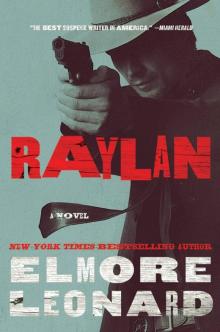 Raylan
Raylan Touch
Touch Mr Majestyk
Mr Majestyk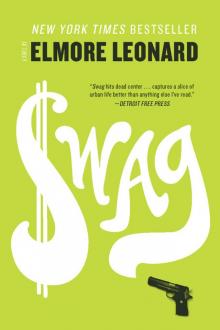 Swag
Swag Road Dogs
Road Dogs La Brava
La Brava The Hot Kid
The Hot Kid Valdez Is Coming: A Novel
Valdez Is Coming: A Novel Be Cool
Be Cool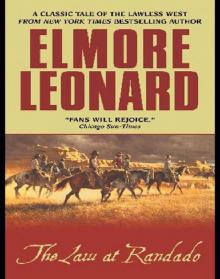 The Law at Randado
The Law at Randado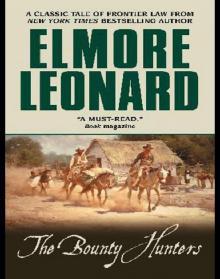 The Bounty Hunters
The Bounty Hunters When the Women Come Out to Dance
When the Women Come Out to Dance 310 to Yuma and Other Stories (1953)
310 to Yuma and Other Stories (1953)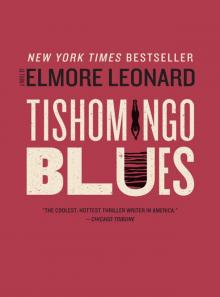 Tishomingo Blues
Tishomingo Blues Cat Chaser
Cat Chaser Pagan Babies
Pagan Babies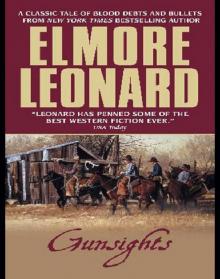 Elmore Leonard's Western Roundup #1
Elmore Leonard's Western Roundup #1 52 Pickup
52 Pickup Stick
Stick The Moonshine War
The Moonshine War Valdez Is Coming
Valdez Is Coming City Primeval
City Primeval Rum Punch
Rum Punch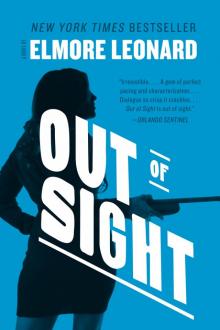 Out of Sight
Out of Sight Naked Came the Manatee (1996)
Naked Came the Manatee (1996) Killshot
Killshot Cuba Libre
Cuba Libre Forty Lashes Less One
Forty Lashes Less One The Complete Western Stories of Elmore Leonard
The Complete Western Stories of Elmore Leonard Pronto
Pronto Split Images
Split Images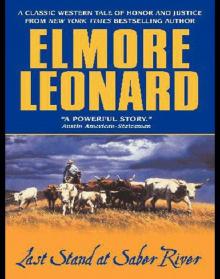 Last Stand at Saber River
Last Stand at Saber River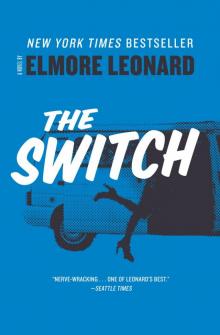 The Switch
The Switch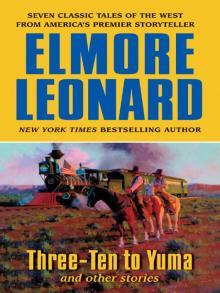 Three-Ten to Yuma and Other Stories
Three-Ten to Yuma and Other Stories Bandits
Bandits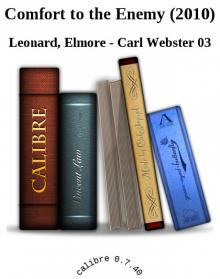 Comfort to the Enemy and Other Carl Webster Stories
Comfort to the Enemy and Other Carl Webster Stories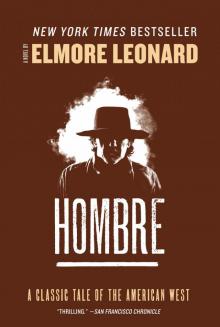 Hombre
Hombre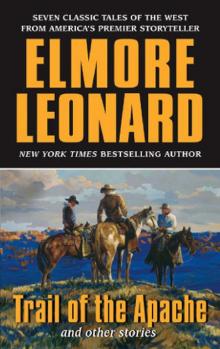 Trail of the Apache and Other Stories
Trail of the Apache and Other Stories LaBrava
LaBrava Gold Coast
Gold Coast Jackie Brown
Jackie Brown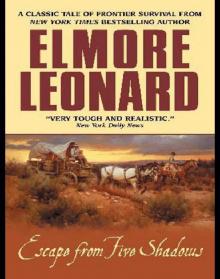 Escape From Five Shadows
Escape From Five Shadows Karen Makes out (1996)
Karen Makes out (1996) Up in Honey's Room
Up in Honey's Room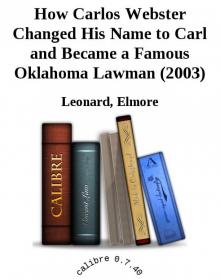 How Carlos Webster Changed His Name to Carl and Became a Famous Oklahoma Lawman (2003)
How Carlos Webster Changed His Name to Carl and Became a Famous Oklahoma Lawman (2003) Mr. Paradise
Mr. Paradise The Hunted
The Hunted Freaky Deaky
Freaky Deaky Louly and Pretty Boy (Ss)
Louly and Pretty Boy (Ss) Glitz
Glitz A Coyote's in the House
A Coyote's in the House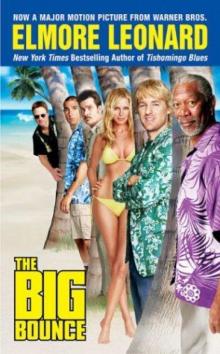 The Big Bounce jr-1
The Big Bounce jr-1 Up in Honey's Room cw-2
Up in Honey's Room cw-2 Unknown Man #89 jr-3
Unknown Man #89 jr-3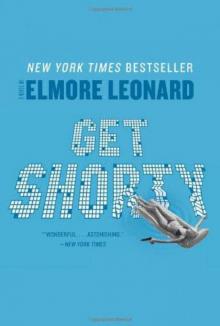 Get Shorty: A Novel cp-1
Get Shorty: A Novel cp-1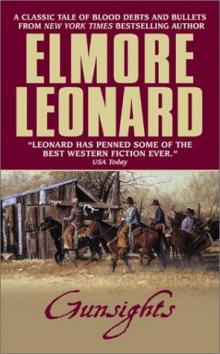 Gunsights
Gunsights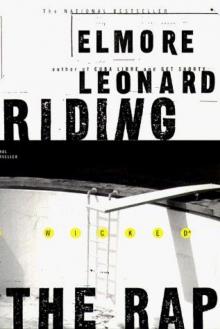 Riding the Rap rg-2
Riding the Rap rg-2